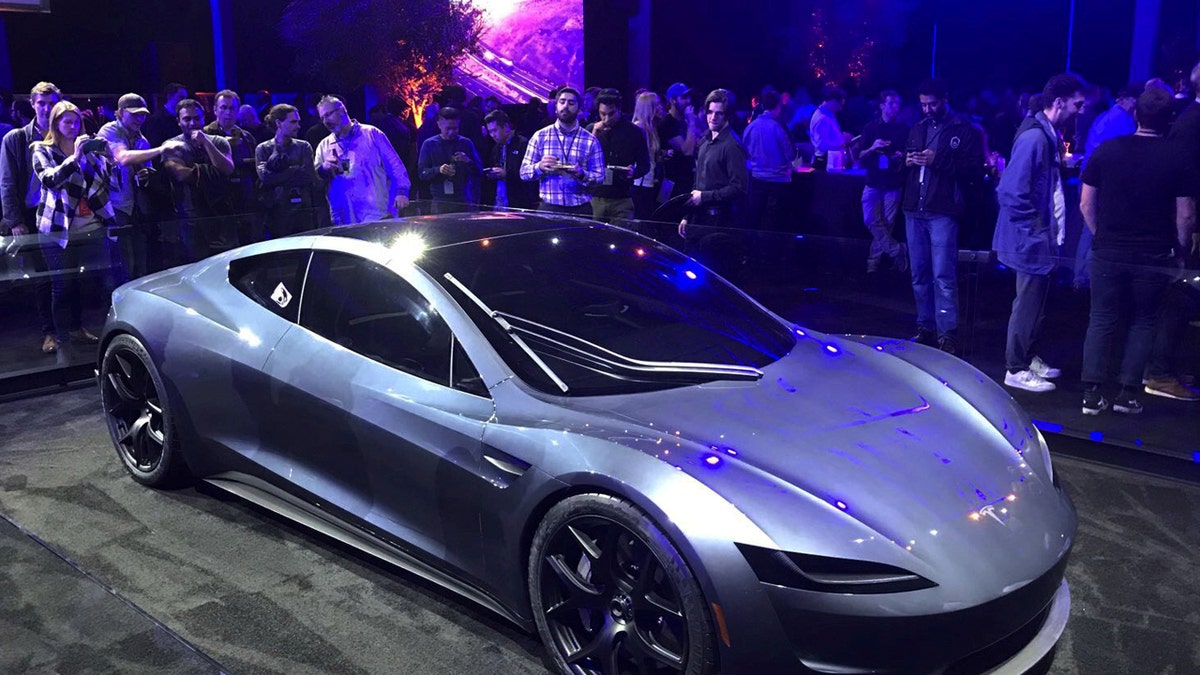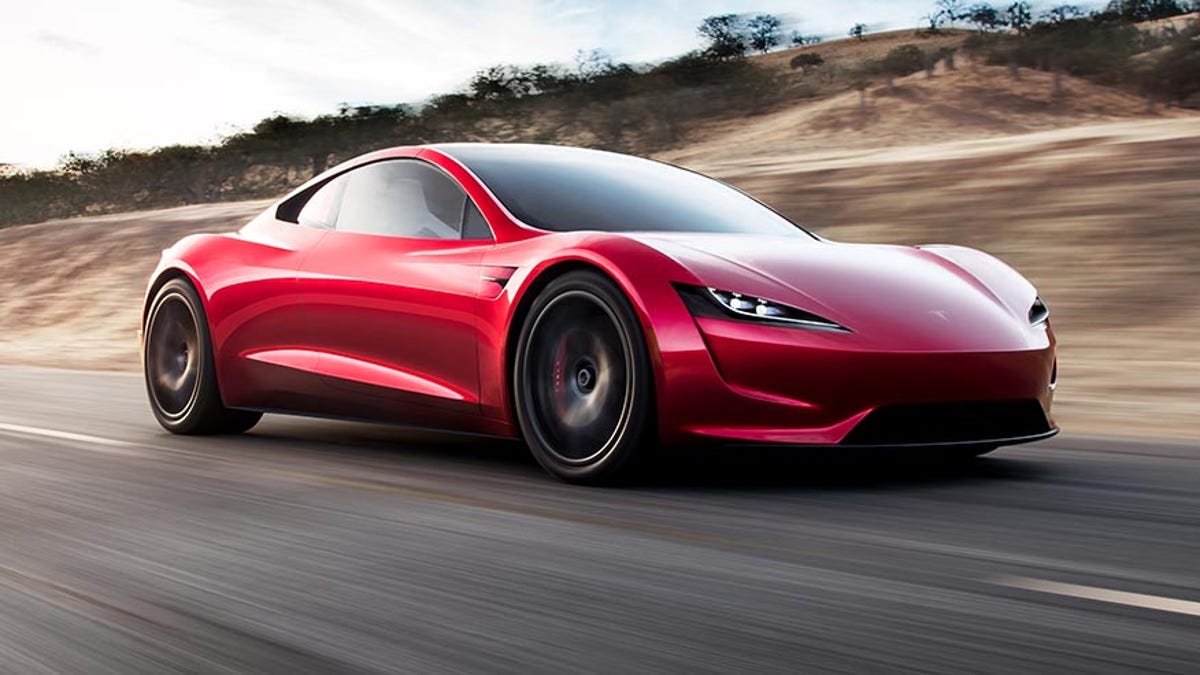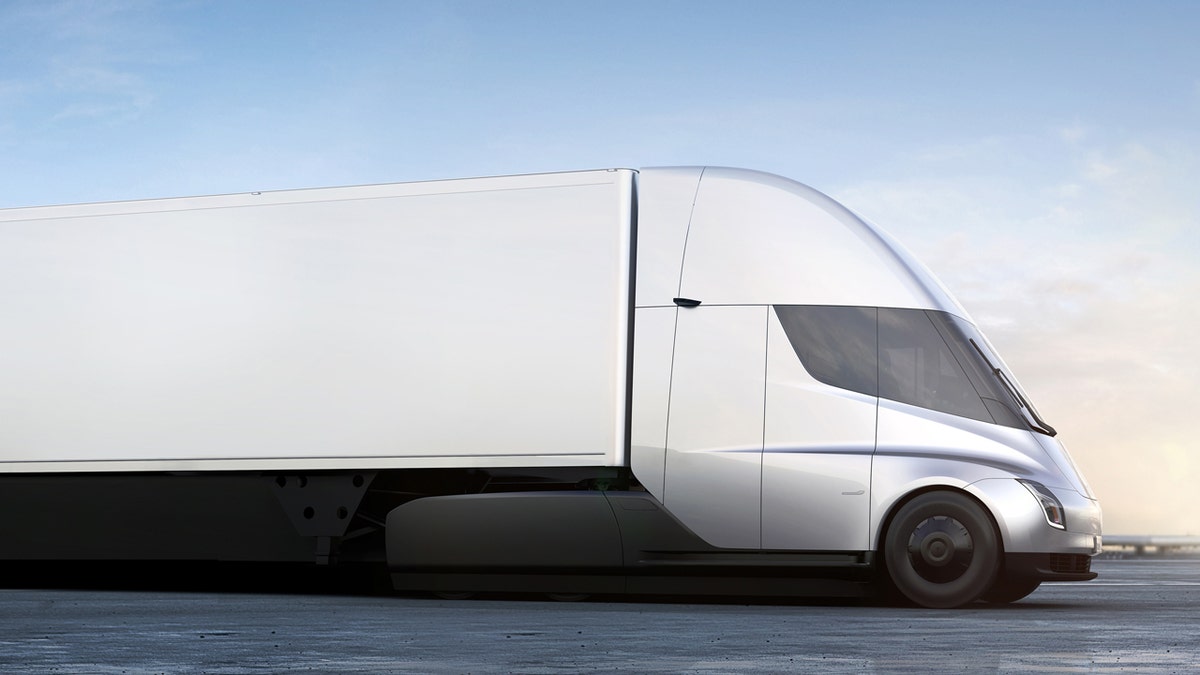
Tesla unveiled a new $200,000 roadster capable of going 0 to 60 miles per hour in 1.9 seconds, Thursday night near its design center in Hawthorne, California. (Reuters)
Telsa unveiled a $200,000 roadster on Thursday the company claims will be the fastest production assembly vehicle ever, with the capability of reaching 0 to 60 in 1.9 seconds.
Elon Musk, the company’s CEO, told the crowd in Hawthorne, Calif., that the four-passenger car has a removable glass roof and can travel 600 miles on a single charge, Reuters reported.

(Tesla)
THE 2020 TESLA ROADSTER IS AN ELECTRIFYING $200,000 SPEED MACHINE
"You’ll be able to travel from LA to San Francisco, and back, at highway speed without recharging. The point of doing this is to just give a hardcore smackdown to gasoline cars. Driving a gasoline sports car is going to feel like a steam engine with a side of quiche,” Musk said.
Car enthusiasts hoping to get their hands on one of the sports cars will have to wait until they become available in 2020, and pay $250,000 if they want to be one of the first thousand behind the wheel. After the first 1,000 cars, the price will drop to the base price of $200,000, Reuters reported.
Musk also introduced the company’s new electric semitractor-trailer. Musk said customers can put $5,000 down now but production will begin in 2019. The semi will be capable hauling 80,000 pounds for 500 miles on a single electric charge, and will be more cost efficient compared to a diesel truck when factoring in gas, maintenance and other expenses.
"We're confident that this is a product that's better in every way from a feature standpoint," Musk told a crowd of Tesla fans gathered for the unveiling.
The truck will have Tesla's Autopilot system, which can maintain a set speed and slow down automatically in traffic. It also has a system that automatically keeps the vehicle in its lane. Musk said several Tesla semis will be able to travel in a convoy, autonomously following each other.

Tesla unveiled its new electric semitractor-trailer on Thursday, Nov. 16, 2017. (Tesla via AP)
The Tesla CEO also said he plans to install a worldwide network of solar-powered “megachargers” that can get a vehicle up to 400 miles of range in just 30 minutes of charging.
To help customers feel at ease, Musk said Tesla will also guarantee the semi’s powertrain for one million miles.
The move fits with Musk's stated goal for the company of accelerating the shift to sustainable transportation, but the semi also adds to the chaos at the Palo Alto, California-based company.
Some analysts are skeptical given the fact that Tesla is already way behind on production of the Model 3, a new lower-cost sedan, is still negotiating on a new factory in China and the company posted a record quarterly loss of $619 million it its most recent quarter.
Musk also has his hands in many different projects, including SpaceX, artificial intelligence and developing a high-speed transit.
"He's got so much on his plate right now. This could present another distraction from really just making sure that the Model 3 is moved along effectively," said Bruce Clark, a senior vice president and automotive analyst at Moody's.
Despite venturing into an unknown market, with the U.S., Europe and China all tightening their emissions regulations, electric truck sales are expected to grow from 4,100 last year, to more than 70,000 in 2026, says Navigant Research.
But most of that growth is expected to be for smaller, medium-duty haulers like garbage trucks or delivery vans. Those trucks can have a more limited range of 100 miles (160 kilometers) or less, which requires fewer expensive batteries. They can also be fully charged overnight.
Long-haul semi trucks, on the other hand, would be expected to go greater distances, and that would be challenging as there is little charging infrastructure currently on global highways.
Without Tesla's promised fast-charging, even a mid-sized truck would likely require a two-hour stop, cutting into companies' efficiency and profits, says Brian Irwin, managing director of the North American industrial group for the consulting firm Accenture.
Irwin says truck companies will have to watch the market carefully, because tougher regulations on diesels or an improvement in charging infrastructure could make electric trucks more viable very quickly. Falling battery costs also will help make electric trucks more appealing compared to diesels.
But even lower costs won't make trucking a sure bet for Tesla. It faces stiff competition from long-trusted brands like Daimler AG, which unveiled its own semi prototype last month.
"These are business people, not fans, and they will need convinced that this truck is better for their balance sheet than existing technology. It probably is, based on the specs provided, but this isn't necessarily a slam dunk," said Rebecca Lindland, an executive analyst at Kelley Blue Book.
The Associated Press contributed to this report.